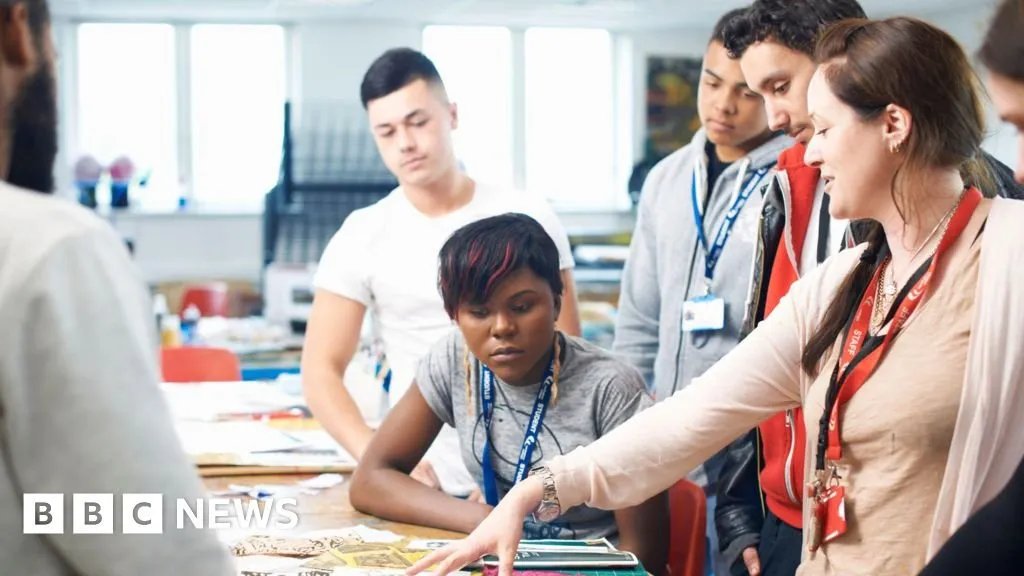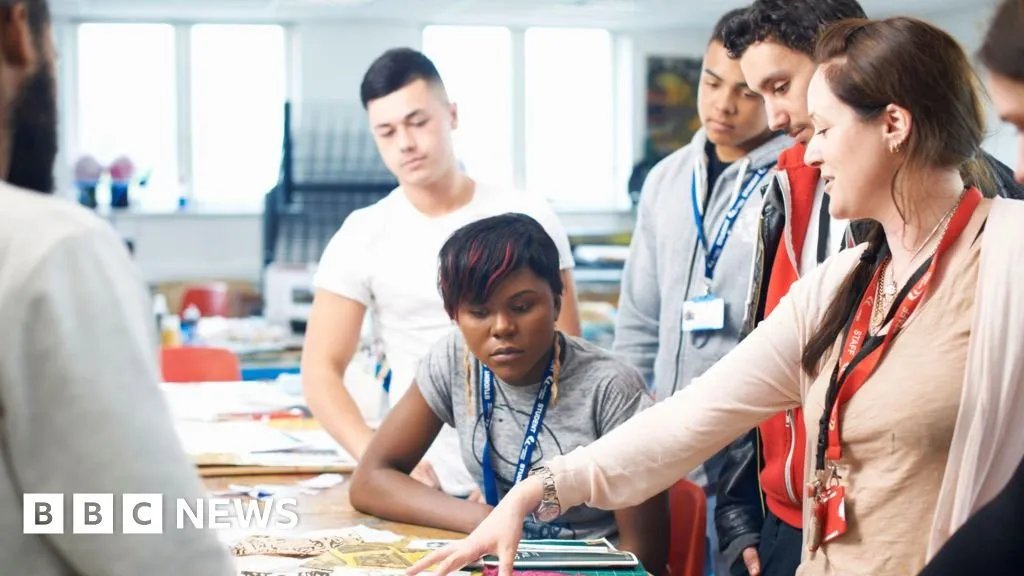
uaetodaynews.com — New V-level courses to be brought in for students after GCSEs
Hazel ShearingEducation correspondent
New vocational courses called V-levels will be rolled out for 16-year-olds under government plans to simplify a “confusing landscape” of qualifications in England.
They are set to replace Level 3 BTecs and other post-16 technical qualifications.
Ministers also plan to reduce the number of teenagers resitting maths and English GCSEs by introducing a new “stepping stone” qualification.
The Sixth Form Colleges Association warned that V-levels may not fill the gap left by BTecs.
Ministers are expected to lay out proposals for higher education funding, including university tuition fees, on Monday afternoon.
The government has launched a consultation on its V-level plans, which form part of its post-16 education and skills white paper.
They come after Prime Minister Sir Keir Starmer stressed the importance of vocational trainingannouncing a target for two-thirds of young people to go to university or study a technical qualification.
Lola Marshall, 17, hopes to do an apprenticeship after her health and social care extended diploma at Leeds City College, and said there wasn’t enough discussion about vocational routes at school.
“Everyone always talked about university and no one ever really helped me decide whether I wanted to do university or an apprenticeship,” she said.
It is not yet clear when V-levels will be introduced, how they will be rolled out, or which subjects will be on offer – although the Department for Education (DfE) gave craft and design and media, broadcast and production as examples.
Skills minister Baroness Jacqui Smith said V-levels aimed to simplify options for students.
“There are over 900 courses at the moment that young people have the choice of, and it’s confusing,” she said.
“(V-levels) will build on what’s good about BTecs and other alternative qualifications – the ability to be able to work practically, the concentration on things that are going to lead to employment.”
Speaking to BBC Breakfast, Education Secretary Bridget Phillipson said the new courses would simplify a “fragmented” and “confusing” system for young people, while giving them a “vocational route into great careers”.
The government was boosting investment in further education, she added, in order to ensure there are enough teachers to deliver them.
Students will still be able to study A-levels or T-levels after their GCSEs, or start an apprenticeship.
Ministers expect many will want to mix and match between A-levels and V-levels.
T-levels, introduced in 2020, already offer a technical route for students, but the initial findings of a government-commissioned review said they shouldn’t be the only option, partly because of their high entry requirements.
Students study one T-level geared towards a specific occupation, whereas they might study three A-levels in different subjects.
Baroness Smith said T-levels therefore suited students who “really know that’s what (they) want to do”, while V-levels would be better for those who were less sure.
Simba Ncube, a T-level student at North Warwickshire and South Leicestershire College, said the availability of V-levels would have made him reconsider his options after he finished his GCSEs.
“It sounds great,” he said.
“It means for those people who are still deciding whether they want to go to university, or go into further education, or jobs or apprenticeships, it leaves them with so many options that they can then narrow down without being limited.”
Plans to scrap BTecs have been under way for a few years, and campaigners have stressed the importance of students having an alternative to A-levels and T-levels.
Bill Watkin, chief executive of the Sixth Form Colleges Association, said students must be able to enrol on BTecs and other courses for the next two years.
“While the detail has yet to be established, there is a risk that the new V-levels will not come close to filling the gap that will be left by the removal of applied general qualifications,” he said.
David Hughes, the chief executive of the Association of Colleges, said V-levels might bring more “clarity and certainty” to further education.
“We’ve seen before lots of attempts to raise the profile of vocational and technical learning – we’ve got to hope this time we get it right as a nation,” he said.
Myles McGinley, managing director of the Cambridge OCR exam board, said V-levels could be a “tremendous opportunity for young people”, adding that the sector would need time to work together and develop courses that meet students’ needs.
Baroness Smith also said a new qualification would be introduced as a “stepping stone” to GCSE resits, helping students who “too often have been on this demoralising roundabout of taking exams and failing them”.
In England, pupils who don’t get at least a grade 4 in GCSE English and maths have to continue studying for it alongside their next course, and are expected to resit.
However, the resit pass rate is low and the policy has proved controversial.
The government said offering a different qualification would “break down barriers to opportunity”, because white working class pupils were twice as likely to need to resit than their better-off classmates.
Ministers still expect pupils who take the new qualification to work towards resitting their GCSEs, although not everyone will.
Its white paper will also propose that teenagers are offered a choice of two “pathways” – one focused on study and one on work – which will set out which qualifications they’ll need to achieve their goals.
Ministers are also due to set out plans for the funding of higher education in England, including setting university tuition fees.
Universities have expressed growing concerns about funding pressures after years of frozen tuition fees, with more than four in 10 universities in England believed to be in a financial deficit.
They say income from fees has failed to match rising costs, and there have been fewer international students – who pay higher rates – coming in to help make up the financial shortfall.
Prof Shearer West, vice chancellor of the University of Leeds, welcomed the fact that domestic tuition fees in England and Wales rose to £9,535 this year but hopes to see further change.
“We’re being asked to do more research with less money and teach more students with fewer resources,” she told the BBC.
“The only way that we can deal with a situation like that is really to cut our costs, which often means that we have to lose staff and you can see that happening across the sector.”
Additional reporting by Branwen Jeffreys and Hope Rhodes
Disclaimer: This news article has been republished exactly as it appeared on its original source, without any modification.
We do not take any responsibility for its content, which remains solely the responsibility of the original publisher.
Disclaimer: This news article has been republished exactly as it appeared on its original source, without any modification.
We do not take any responsibility for its content, which remains solely the responsibility of the original publisher.
Author: uaetodaynews
Published on: 2025-10-20 11:31:00
Source: uaetodaynews.com
